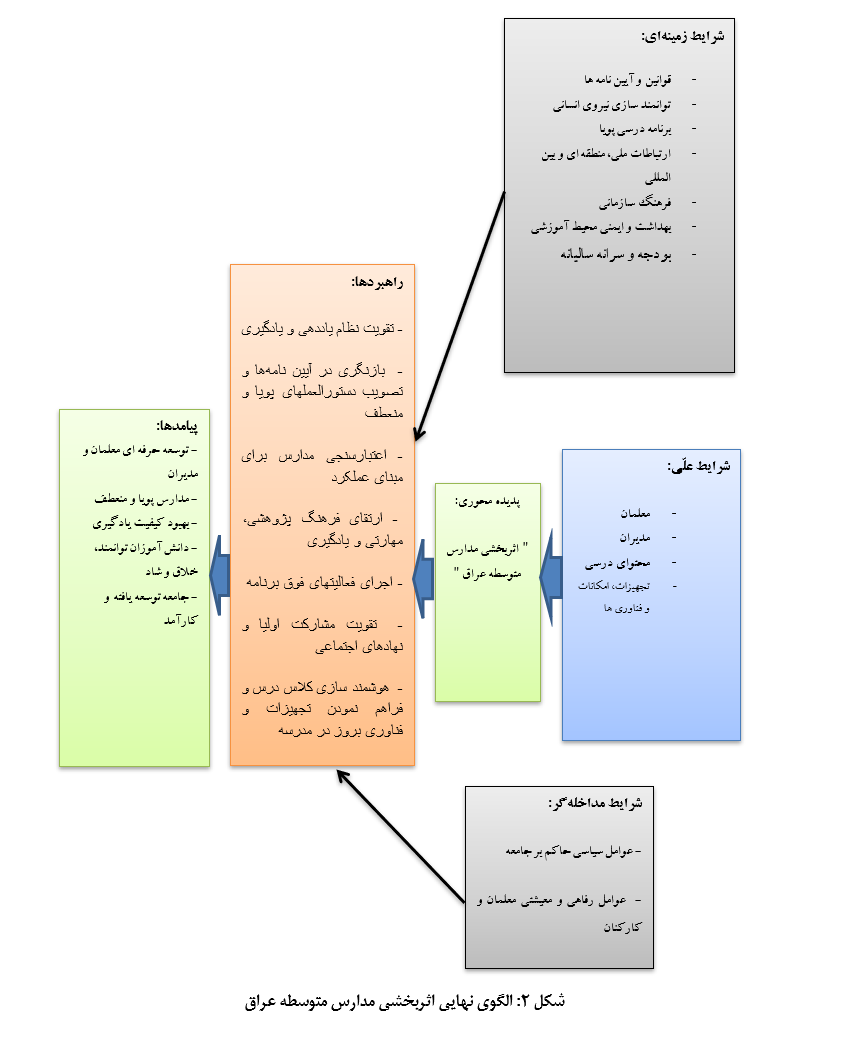طراحی مدل پارادایمی مدارس اثربخش هزاره سوم در کشور عراق: بر اساس نظریه داده بنیاد
کلمات کلیدی:
مدارس اثربخش, هزاره سوم, نظریه دادهبنیاد, آموزش در عراق, مدل پارادایمیچکیده
این پژوهش با هدف طراحی مدل پارادایمی مدارس اثربخش برای هزاره سوم در کشور عراق انجام شده است. از رویکرد کیفی مبتنی بر نظریه دادهبنیاد استفاده شد و دادهها از طریق مصاحبههای نیمهساختاریافته با 10 خبره در حوزه آموزش جمعآوری گردید. تحلیل دادهها با استفاده از کدگذاری باز، محوری و انتخابی صورت گرفت. نتایج پژوهش منجر به ارائه یک مدل پارادایمی شد که شامل پنج بخش اصلی: شرایط علی: شامل معلمان، مدیران، محتوای درسی و تجهیزات و فناوریها، شرایط زمینهای: شامل قوانین، توانمندسازی نیروی انسانی، برنامه درسی، ارتباطات، فرهنگ سازمانی، بهداشت و ایمنی، و بودجه، شرایط مداخلهگر: شامل عوامل سیاسی، رفاهی و معیشتی، مشارکت والدین و آسیبهای اجتماعی، راهبردها: شامل تقویت نظام یاددهی-یادگیری، بازنگری آییننامهها، اعتبارسنجی مدارس، ارتقای فرهنگ پژوهشی، اجرای فعالیتهای فوق برنامه، ارتباط با جامعه و صنعت، مشارکت اولیا، هوشمندسازی و پیشگیری از آسیبهای اجتماعی، پیامدها: شامل توسعه حرفهای معلمان و مدیران، مدارس پویا و منعطف، بهبود کیفیت یادگیری، دانشآموزان توانمند و خلاق، و جامعه توسعهیافته بوده است. این مدل میتواند به عنوان چارچوبی جهت طراحی و بهبود مدارس اثربخش در هزاره سوم در کشور عراق مورد استفاده قرار گیرد.
دانلودها
مراجع
Schleicher A. World class. Paris: OECD Publishing; 2018.
Adesina AE. Perceived impact of primary education on the attainment of Nigeria Vision 2020. Mediterranean Journal
of Social Sciences. 2011;2(5):61-9.
Sulej KC. Human resources development as an element of sustainable HRM with the focus on production engineers.
Journal of Cleaner Production. 2021;278:143.
Muringani J, Fitjar RD, Rodríguez-Pose A. Social capital and economic growth in the regions of Europe. Environment
and Planning A: Economy and Space. 2021.
García-Jiménez J, Torres-Gordillo JJ, Rodríguez-Santero J. Factors Associated with School Effectiveness: Detection
of High- and Low-Efficiency Schools through Hierarchical Linear Models. Educ Sci. 2022;12(59).
Kuhl PK, Lim SS, Guerriero S, van Damme D. How the Science of Learning Is Changing Science Assessment. Paris:
OECD Publishing; 2019.
Ferguson J. A theoretical framework and exploration of organizational effectiveness of schools. Educational
Administration Quarterly. 2017;21(2):117-34.
Ebrahimi Tabar R, Sattari Sa-D, Soleimani T. Designing an Effective Management Model in Third-Millennium
Schools (Case Study of School Principals in Ardabil Province). Sociology of Education. 2023;9(1):137-46.
Kiani F, Zahed Babolan A, Khaleqkhah A, Akbari T. Designing and Validating a Model for a Successful School
Culture. Scientific Journal of Organizational Culture Management. 2022;21(1):41-60.
Shahsavari T, Soleimanpour Omran M, Hafezian M. Validation of the Model of Learning and Teaching Schools in
Education. Scientific-Research Bimonthly on New Approaches in Educational Management. 2021;12(4):53-72.
Ghanbari S, Majouni H. The Impact of Ethical Leadership on Organizational Effectiveness in Schools with the
Mediating Role of Psychological Empowerment and Teacher Creativity. Research on Educational Systems. 2021;15(53):163-
Abedi Koushki S, Amin Bidokhti AA, Zeinabadi HR. Designing a Successful School Management Process Model
Based on Findings from the International ISSPP Study. Education Strategies in Medical Sciences. 2021;15(2).
Kabiri M. Modeling Factors Influencing the Effectiveness of Primary Schools in Tehran, with an Emphasis on Sixth
Grade Mathematics. Journal of Management in Educational Organizations. 2021;11(1):119-36.
Kouhi A, Hashemi A, Minaei A, Dehghan A. The Relationship Between Empowering School Structure, Teacher Job
Satisfaction, and Effectiveness of Primary Schools in Qarchak. Occupational and Organizational Counseling. 2019;11(40):99-
Jafari Rad A, Zahed Babolan A, Moradi M, Samari I. Strategy, Context, and Outcome of Developing Competencies
of Secondary School Principals (Qualitative Study). Scientific-Research Bimonthly on New Approaches in Educational
Management. 2020;11(44):237-62.
Maleki Avaresin S, Soudi H. Designing a Structural-Interpretive Model (ISM) for Effective School Components in
Lower Secondary Education. Journal of School Administration. 2019;7(1):126-46.
Soudi H, Maleki Avaresin S, Talebi B. Developing a Model for Effective Schools in Lower Secondary Education.
Family and Research Quarterly. 2018;16(1):101-26.
Imani J, Bagheri M, Jafari P, Qurchian NQ. Reviewing Components and Indicators of Secondary School Effectiveness
in Hormozgan Province to Present a Model for Improving the Educational System. Educational Leadership Research.
;4(14):25-61.
Urumchi D, Vahdat R, editors. Identifying and Presenting a Suitable Model for an Effective School. International
Congress on Humanities and Cultural Studies; 2016; Tehran.
Fink LD. Creating significant learning experiences: An integrated approach to designing college courses. San
Francisco: Jossey-Bass Publishers; 2019.
Ugochukwu A, Akueyinwa OC, Ndubueze OJ. Effective School Management in Nigerian Secondary Schools: Issues,
Challenges and Way Forward. International Journal of Innovative Research and Advanced Studies. 2021;8(6):34-9.
Pekkolay S. Effective School Management. Journal of Advances in Education and Philosophy. 2021;5(8):231-5.
Chin JM-c, Chuang C-P. The Relationships among School-Based Budgeting, Innovative Management, and School
Effectiveness: A Study on Specialist Schools in Taiwan. Asia-Pacific Education Researcher. 2015;24(4):679-93.
Gray J. Investigating the Role of Collective Trust, Collective Efficacy, and Enabling School Structures on Overall
School Effectiveness. Education Leadership Review. 2016;17(1):114-28.
Alammar L. The Effective School: The Role of the Leaders in School Effectiveness. Educational Research and
Reviews. 2015;10:695-721.

دانلود
چاپ شده
ارسال
بازنگری
پذیرش
شماره
نوع مقاله
مجوز
حق نشر 2024 نشریه پژوهش و نوآوری در تربیت و توسعه

این پروژه تحت مجوز بین المللی Creative Commons Attribution-NonCommercial 4.0 می باشد.










